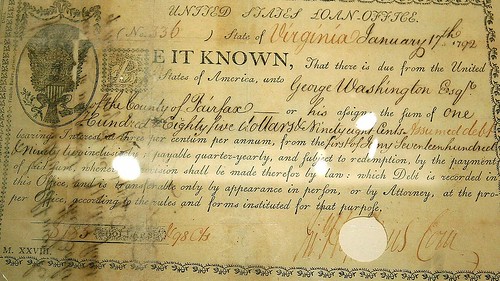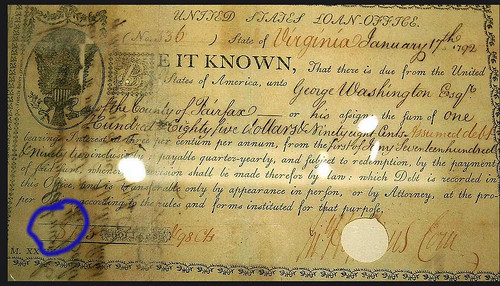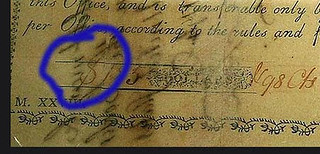
PREV ARTICLE
NEXT ARTICLE
FULL ISSUE
NOTES FROM E-SYLUM READERS: JANUARY 5, 2020Washington's Dollar Sign Located
Regarding the 1792 George Washington bond illustrated last week, I asked, "... where exactly is the dollar sign the caption refers to? The bond is hard to read because writing on the back is bleeding through. " -Editor  Don Cleveland writes: Washington's dollar sign is at the lower left of the document, just above the III of M.XXVIII. Bill Eckberg also spotted the dollar sign, and helpfully circled it. Martin Purdy of New Zealand also located it. Thanks, everyone. -Editor  To read the earlier E-Sylum article, see:
Careful With That Stapler!
"Relative to stapling or removing coins from stapled 2x2s: I am reminded of the story of how legendary collector Harry Bass once put a staple into a Proof-only 1863 gold quarter eagle." Ouch! -Editor To read the earlier E-Sylum article, see:
Saint Wulfric
"There are numerous entries in Wikipedia for a Wulfric who became a saint. So I guess the seal is not his only mark. An heraldic whiz might be able to locate his arms...!" To read the earlier E-Sylum article, see:
The Deep Detail of Linotypy
Three cheers for Harvey Stack's use of the term "leadering". So much time have I into the brain-racking of gregarious insecurity. Often enough the clue to turning off an unintended tangent is found in the homophony of something, either English or foreign, but of what? Can't stop remembering your Canadian friend who really pronounced the "T" as "T" that time? Since when am I interested on the deep detail of linotypy? Ah. The homophony of what! To read the earlier E-Sylum article, see:
 Wayne Homren, Editor The Numismatic Bibliomania Society is a non-profit organization promoting numismatic literature. See our web site at coinbooks.org. To submit items for publication in The E-Sylum, write to the Editor at this address: whomren@gmail.com To subscribe go to: https://my.binhost.com/lists/listinfo/esylum All Rights Reserved. NBS Home Page Contact the NBS webmaster 
|
